De Duitse schrijver, dichter, musicus, liedjesmaker, zanger en graficus Hartmut Barth-Engelbart werd geboren op 11 april 1947 in Michelstadt. Zie ook mijn blog van 11 april 2007 en ook mijn blog van 11 april 2009 en ookmijn blog van 11 april 2010.
Kinder sind wie Bäume
Kinder sind wie Bäume
Bäume sind wie Kinder
Sie brauchen Schlaf und Träume
und ganz allein Zusammensein
den dunklen Wald, versteckte Winkel
und große helle Räume
Und wer sie zwingt zu blühen
im Herbst oder im Winter
der kann sich noch so mühen
Kinder sind wie Bäume
Bäume sind wie Kinder
Lässt du den Bäumen
Zeit zum Träumen
dann sind die Blüten
nicht mehr weit
sie kommen von alleine
wie Kinder auf die Beine
Brotlos
(Für die warnstreikende ABB-Belegschaft in Alzenau)
Die Literaturpreise
fallen
nicht vom Himmel
wenn wir nicht für ihre Interessen schreiben
die da für unsre Zukunft
streiken
werden sie uns nicht vergeben
die Literaturpreise
liegen
auf der Straße
warten vor der Arbeitsagentur
Ob unsre Lieder
sie verdienen
werden wir erst dann verstehen
wenn wir von unsren Denkmalsockeln steigen
und uns denen zeigen
sie denen und mit
denen singen
die uns unser täglich Brot
nächtlich backen täglich bringen
und für einen Hungerlohn
davon zur Not
noch leben können
Ohne sie
wär Kunst
nur brotlos
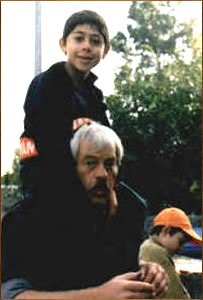
Hartmut Barth-Engelbart (Michelstadt, 11 april 1947)
De Duitse dichteres en schrijfster Barbara Köhler werd geboren op 11 april 1959 in Burgstädt. Zie ook mijn blog van 11 april 2007 en ook mijn blog van 11 april 2009 en ook mijn blog van 11 april 2010.
GUTEN TAG
immer hinterher im regen stehen
gelassen bleiben als ob gehen
die frage sei: dahingestellt
& was aus allen Wolken fällt
mir zu betrifft mich offenherzig
verheult verlacht den rest verschmerz ich
vergeh verkomme auf dich zu
entferne mich was bleibt bist du
bei trost bei dir beizeiten
JUST TRAVELLIN’ es kommt nicht an
auf sprüche soviel ist versprochen
und haltlos was ich sagen kann
verstummt verspielt zwischen uns beiden
der regen naß bis auf die knochen
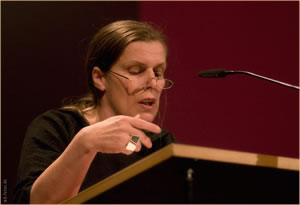
Barbara Köhler (Burgstädt, 11 april 1959)
De Oostenrijkse schrijfster Marlen Haushofer werd geboren op 11 april 1920 in Frauenstein (Molln). Zie ook mijn blog van 11 april 2010.
Uit: Die Wand
„Ich erwachte davon, dass die Sonne auf mein Gesicht fiel, und erinnerte mich sofort an den vergangenen Abend. Da wir nur einen Hüttenschlüssel mithatten, der zweite lag beim Jäger, hätten Luise und Hugo mich bei ihrer Rückkehr wecken müssen. Im Schlafrock rannte ich die Stiege hinunter und sperrte die Eingangstür auf. Luchs empfing mich ungeduldig winselnd und wischte an mir vorbei ins Freie. Ich ging ins Schlafzimmer, obgleich ich sicher war, dort keinen Menschen zu finden, das Fenster war ja vergittert, und selbst durch ein unvergittertes Fenster hätte sich Hugo nicht durchzwängen können. Die Betten waren natürlich unberührt.
Es war acht Uhr; die beiden mussten im Dorf geblieben sein. Ich wunderte mich sehr darüber. Hugo verabscheute die kurzen Wirtshausbetten, und er wäre niemals so rücksichtslos gewesen, mich allein über Nacht im Jagdhaus zurückzulassen. Ich konnte mir nicht erklären, was geschehen war. Ich ging wieder hinauf in meine Schlafkammer und zog mich an. Es war noch sehr kühl, und der Tau glitzerte auf Hugos schwarzem Mercedes. Ich kochte Tee und wärmte mich ein wenig auf, und dann machte ich mich mit Luchs auf den Weg ins Dorf.
Ich merkte kaum, wie kühl und feucht es in der Schlucht war, weil ich darüber nachgrübelte, was aus den Rüttlingers geworden sein mochte. Vielleicht hatte Hugo einen Herzanfall erlitten. Wie es so geht, im Umgang mit Hypochondern, hatten wir seine Zustände nicht mehr ernst genommen. Ich beschleunigte meine Schritte und schickte Luchs voraus. Freudig bellend zog er ab. Ich hatte nicht daran gedacht, meine Bergschuhe anzuziehen, und stolperte ungeschickt über die scharfen Steine hinter ihm her.“
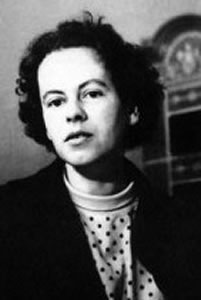
Marlen Haushofer (11 april 1920 – 21 maart 1970)
De Hongaarse schrijver Sándor Márai werd geboren op 11 april 1900 in Kassa (nu Košice, Slowakije). Zie ook mijn blog van 11 april 2007 en ook mijn blog van 11 april 2009 en ook mijn blog van 11 april 2010.
Uit: Embers (Vertaald door Carol Janeway)
“Wait,” he said over his shoulder to the gamekeeper, who was about to leave the room to dispose of cane and hat.
He crumpled the letter into his pocket. “Tell Kalman to harness up at six o’clock. The Landau, because there’s rain in the air. And he is to wear full-dress livery. You too,” he said with unexpected force, as if suddenly angered. “Everything must shine. The carriage and harness are to be cleaned immediately. Then put on your livery, and seat yourself next to Kalman on the coachbox. Understood?”
“Yes, Excellence,”said the gamekeeper, looking his master directly in the eye. “At six o’clock.” “At half past six you will leave,” said the General, and then appeared to be making some calculation, for his lips moved silently. “You will go to the White Eagle. All you are to say is that I have sent you, and the carriage for the Captain is waiting. Repeat.”
The gamekeeper repeated the words. Then the General raised his hand, as if he had just thought of something else, and he looked up at the ceiling but didn’t say anything and went upstairs to the second floor. The gamekeeper, still frozen to attention, watched him, unblinking, and waited until the thickset, broad-shouldered figure disappeared around the turn of the stone balustrade.
The General went into his room, washed his hands, and stepped over to his high, narrow standing desk; arranged on its surface of unstained green felt were pens, ink, and a perfectly aligned stack of those notebooks covered in black-and-white-checked oilcloth commonly used by schoolchildren for their home- work. In the middle of the desk stood a green-shaded lamp, which the General switched on, as the room was dark. On the other side of the closed blinds, in the scorched, withered garden, summer ignited a last blaze like an arsonist setting the fields on fire in senseless fury before making his escape.
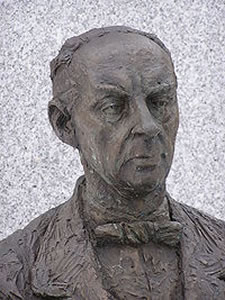
Sándor Márai (11 april 1900 – 22 februari 1989)
De Amerikaanse schrijver David Westheimer werd geboren op 11 april 1917 in Houston, Texas. Zie ook mijn blog van 11 april 2010.
Uit: Von Ryan’s Express
„He turned to the lieutenant.
‘Have him clean that piece.’
The lieutenant stared with brown fawn’s eyes, a look of anxious concentration on his smooth face.
‘Have him clean that carbine,’ the American said. ‘Not that Fm trying to help you run your war but I wouldn’t want anybody shot by a filthy carbine.’
‘Si, colonnello,’ the lieutenant said hastily, wondering why he was taking orders when he should be giving them but unable to withstand the prisoner’s cold assurance. ‘Domani. Tomorrow.’
‘Domani,’ the American said. ‘God knows how many times I’ve heard that word in the last six hours.’
He returned to his scrutiny of the squirming sentry.
‘Ask him when he shaved last,’ he demanded, without taking his eyes from the man.
The lieutenant asked. The man answered sullenly and hung his head. The lieutenant snapped at him. The sentry snapped back. They argued with increasing heat.
‘As you were!’ the American ordered.
They stopped immediately and looked at him as if awaiting instructions.
‘Lieutenant,’ the American said with patient irony, ‘no wonder you people are losing a war. An officer does not argue with an enlisted man. He tells him.’
‘I know colonnello,’ the lieutenant said apologetically. ‘But these imbecilli … Those who guard the prigionieri are, how you say, the dregess.’
‘Dregs,’ the American corrected. ‘You’re assigned to this prison camp, aren’t you, lieutenant?’ The lieutenant looked betrayed. He was perhaps twenty-two, with a sensitive, handsome face. His hair was dark and curly, his jaw firm, his lips full.
‘While I’m on the subject,’ said the American, ‘when was the last time you had a shave, lieutenant?’
‘Only this morning,’ the lieutenant said eagerly, thrusting his face forward for closer inspection.
The American drew back distastefully.“
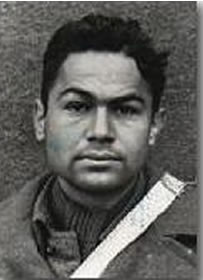
David Westheimer (11 april 1917 – 8 november 2005)
De Australische dichter, schrijver en journalist Bernard O’Dowd werd geboren op 11 april 1866 in Beaufort, Victoria. Zie ook mijn blog van 11 april 2010.
Last Stanzas of the Bush
Where is Australia, singer, do you know?
These sordid farms and joyless factories,
Mephitic mines and lanes of pallid woe?
Those ugly towns and cities such as these
With incense sick to all unworthy power,
And all old sin in full malignant flower?
No! to her bourn her children still are faring:
She is a temple that we are to build:
For her the ages have been long preparing:
She is a prophecy to be fulfilled!
All that we love in olden lands and lore
Was signal of her coming long ago!
Bacon foresaw her, Campanella, More,
And Plato’s eyes were with her star aglow!
Who toiled for Truth, whate’er their countries were,
Who fought for Liberty, they yearned for her!
No corsair’s gathering ground, nor tryst for schemers,
No chapman Carthage to a huckster Tyre,
She is the Eldorado of old dreamers,
The Sleeping Beauty of the world’s desire.
She is the scroll on which we are to write
Mythologies our own and epics new:
She is the port of our propitious flight
From Ur idolatrous and Pharaoh’s crew.
She is our own, unstained, if worthy we,
By dream, or god, or star we would not see:
Her crystal beams all but the eagle dazzle.
Her wind-wide ways none but the strong-winged sail:
She is Eutopia, she is Hy-Brasil,
The watchers on the tower of morning hail!
Yet she shall be as we, the Potter, mould:
Altar or tomb, as we aspire, despair:
What wine we bring shall she, the chalice, hold:
What word we write shall she, the script, declare:
Bandage our eyes, she shall be Memphis, Spain:
Barter our souls, she shall be Tyre again:
And if we pour on her the red oblation,
All o’er the world shall Asshur’s buzzards throng:
Love-lit, her Chaos shall become Creation:
And dewed with dream, her silence flower in song.
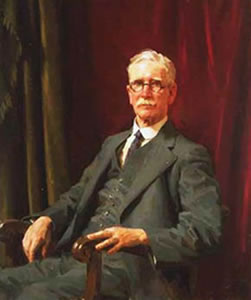
Bernard O’Dowd (11 april 1866 – 1 september 1953)
Portret door Will Rowell
